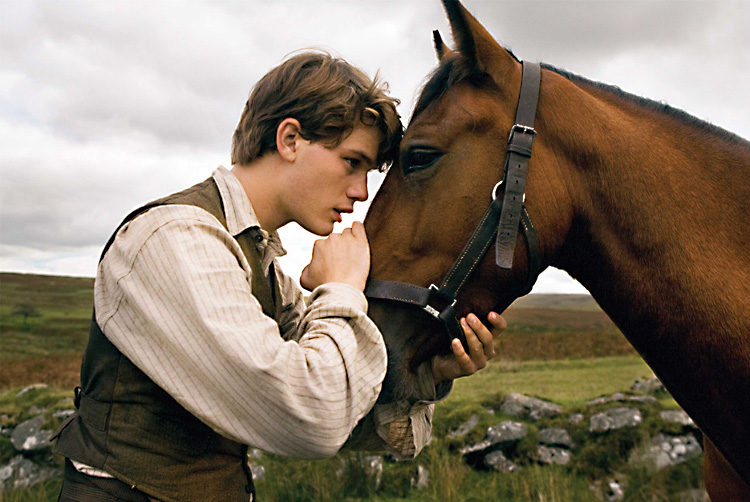A tale imbued with the very essence of a Steven Spielberg story, it’s little wonder that “the beard” snapped up the chance to take the reins of this cinematic adaptation of Michael Morpurgo’s children’s book, perhaps now more famously recognised as an award-winning stage play. It’s a rare case of director and material being completely symbiotic, and War Horse benefits wonderfully from this marriage.
It’s the war-torn tale of Albert, a young Devonshire farm boy (Jeremy Irvine) and the diminutive work horse named Joey, which his father (Peter Mullan) purchases on a whim, much to the disgust of his long-suffering wife (Emily Watson) who knows that one fallow season will cost them their rented farm. Over time an inseparable bond is formed between Albert and Joey, one which is tested when the equine poster boy is shipped off to serve in World War I, possibly never to return.
Beautifully evoking a cinematic time of yore, thanks largely to the sweeping and often breathtaking cinematography of long-time Spielberg collaborator, Janusz Kaminski, War Horse is a stunning beast to behold. The animated postcard effect of the final shots, the sparsely lit harshness of no-mans land, or the rural tranquillity of an idyllic Devon village, which even looks appealing during torrential rain, frame-for-frame you'd be hard pushed to find a more sumptuous looking film than this.
But what of the heart that permeates this story of man and beast, the crux of the narrative and the reason to care that Albert would go to these lengths to be reunited with his steed? This will be the polarising factor behind the film’s success.
Those who are averse to the Spielberg sentiment will find it a tad too cloying, with John Williams’s rousing score orchestrating the intended emotional reaction. But those who embrace the saccharine aspects that are necessary for a story such as this will revel in the excellent devices used. The way Spielberg does his best to bring subtle characteristics to Joey; only once does the hint of digitised eyes jolt you from fully embracing this four-legged star.
Arriving straight from stage school, Irvine does his best as the naïve young farm worker – his devotion to his horse is always believable but it’s his reluctance to give Albert any kind of edge that lets the relationship down; his over-earnestness makes him hard to root for and a tad annoying.
Emily Watson and Peter Mullan are also fine occupying their largely thankless roles, but it says a lot that they are acted off the screen by the hilarious film stealing goose. [video]http://www.youtube.com/watch?v=B7lf9HgFAwQ[/video]
So it’s left to those that make fleeting appearances during the film’s episodic structure (you can almost feel where the lights would have faded on stage) to make the most impact. Undoubtedly the scene of the film is the battlefield exchange between Toby Kebbell’s Geordie soldier and his German counterpart. It’s a wonderful sequence made all the more resonant by the preceding barbed wire incident that demands a huge intake of breath from the audience.
Tom Hiddlestone’s admirable soldier also makes an indelible impression in one of the few times that the anticipated tears threaten to surface.
And that’s the true underlying flaw with War Horse: it’s almost too perfect and glossily packaged that the heightened stagey dramatics establish a distance between the story and the audience, which results in a failure to connect. There are magical moments, but as a whole you admire it rather than fall in love with it.
[etRating value=“ 4”]






